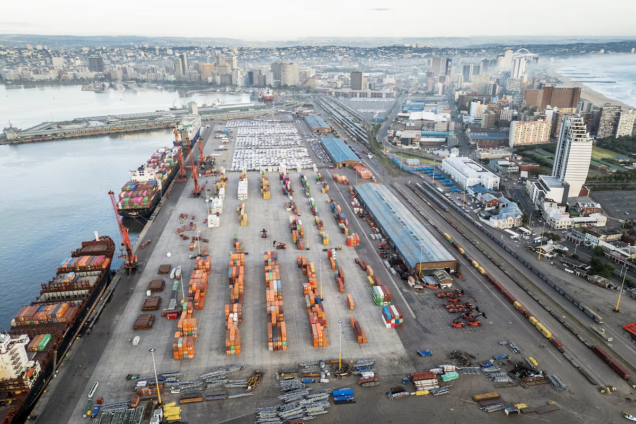South Africa has no immediate plans to retaliate against the United States over tariffs announced by President Donald Trump this week and will instead seek to negotiate exemptions and quota agreements, senior government officials said on Friday.
Trump imposed a 31% tariff on U.S. imports from South Africa on Wednesday, when he announced a 10% baseline tariff on all imports and higher targeted duties on dozens of countries.
The United States is South Africa's second-largest bilateral trading partner after China.
Africa's most industrialised nation has said previously that it wants to agree a bilateral trade deal with Trump's team. That looks to be a tall order, however, after the U.S. president's repeated attacks on South Africa since his return to the White House in January.
"To say we will impose reciprocal tariffs without first understanding how the U.S. arrived at 31% ... would be counterproductive," trade minister Parks Tau told a press conference, saying South Africa's average tariff on imports was 7.6%.
Foreign affairs minister Ronald Lamola, meanwhile, said Trump's tariffs effectively nullified the benefits African countries had enjoyed under the African Growth and Opportunity Act.
The AGOA initiative, which grants qualifying African nations duty-free access to the U.S. market, is due to expire in September. And Trump's far-reaching tariffs suggest that a renewal of the trade accord enacted in 2000 is now unlikely.
The actions by the United States underscored the need for South Africa to accelerate efforts to diversify its export markets, the ministers said, mentioning markets in Asia and the Middle East as potential opportunities.
In the meantime, they said the government would seek to support industries most affected by the tariffs, including car manufacturing, agriculture, processed foods and metals.
The government will not remove benefits U.S. carmakers enjoy under its Automotive Production Development Programme, a production incentive scheme, Tau said.
South Africa's National Treasury estimates that losing its AGOA status could reduce economic growth by less than 0.1 percentage points.
The central bank has modelled several scenarios related to South Africa's access to U.S. markets, with the impacts ranging from under 0.1 percentage points to 0.7 percentage points depending on the severity of the trade barriers and how badly financial market sentiment is affected.
Trump's latest tariffs are in addition to the 25% imposed on all vehicles and car parts imported into the U.S. That is a particular threat to South Africa, which exports over $2 billion a year in vehicles and auto parts to the U.S.
Latest Stories
-
Mahama proposes ceremony to honour Agya Koo Nimo
48 minutes -
Blackstar Experience: Government’s flagship programme for tourism, culture and creative arts launched
2 hours -
COCOBOD probes $263 million cocoa rehabilitation loan disbursement
2 hours -
COCOBOD CEO reveals plans to protect cocoa farms from miners
2 hours -
Afenyo-Markin accuses Council of State of complicity in Chief Justice’s suspension
5 hours -
PHOTOS: President Mahama applauds workers on May Day
5 hours -
Zoomlion Ghana responds to contractual engagement with Youth Employment Agency
5 hours -
INTERPOL targets stolen vehicle trafficking in West African police operation
5 hours -
Brazil extend Ancelotti deadline amid Madrid standoff – sources
6 hours -
Next round of Iran-US nuclear talks postponed
6 hours -
From ‘Otwebompitil” to the Supreme Court; congratulations, my lord Justice Kweku Tawiah Ackaah-Boafo
6 hours -
Clooney gets Tony nomination for Broadway debut
6 hours -
Our wage situation has worsened – TUC to Mahama
6 hours -
5th May demo not about NPP but judicial independence – Afenyo-Markin
6 hours -
NPP National Chairman hasn’t abandoned ‘Thank you’ tour – Justin Kodua
6 hours

